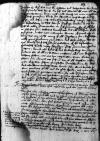Ess hat uns der achtbar und hochgelarte her, doctor ⌊Christophorus Heil⌋, / der sich viel jhar bei Ewer Erbarkeit ehrlich vorhaltenn, / denen auch nicht wenig, wo man in gebrauch[t], dinstlich gewesenn, / durch sein ⌊⌋ angelangt und boclagt, / wie ihnn noch etwas hinderstellig / wegen des salario, welches ihm sei zugesagt worden, do ehr die schule zu worwalten an sich genomen, / bei Ewer Erbarkeit solte bliben sein, / das ehr auch etzlich mal an Ewer Erbarkeit gefurdert, / nichts aber erlangenn konnen. / Dieweil ehr nu weiss, das wir nicht wenig Ewer Erbarkeit zugethann sein, / diesulbten auch gerne furderenn, / und ihnen das beste rathenn, / hat ehr uns darauf dinstlich fleises gebethenn, / Ewer Erbarkeit deshalbenn freuntlich durch unser schreibenn zuerinernn und ersuchenn, / damit ehr dadurch uns das hinderstellige von seinem salario bei Ewer Erbarkeit erhaltenn mochte. / Die wir den freuntlichenn bittenn, / wie wir von obgedochten herren ⌊doctori⌋ gebetenn sein, / dieweil ehr sich nu von Ewer Erbarkeit an ander orter begibet, / ihnen genuglichen zuentscheidenn, / damit ihm keine ursache gebenn werde, Ewer Erbarkeit und die gutte ⌊stadt⌋, / wie man pflegt, / umb solchenn geringenn willen / zur rede zusetzenn, / worin sich Ewer Erbarkeit, / die wir gotlichenn genaden bevelen, / wol werden wissen zuhalten und sich wilferig unserthalben kegen obgedochten ⌊doctorem⌋ erzeigenn. /
